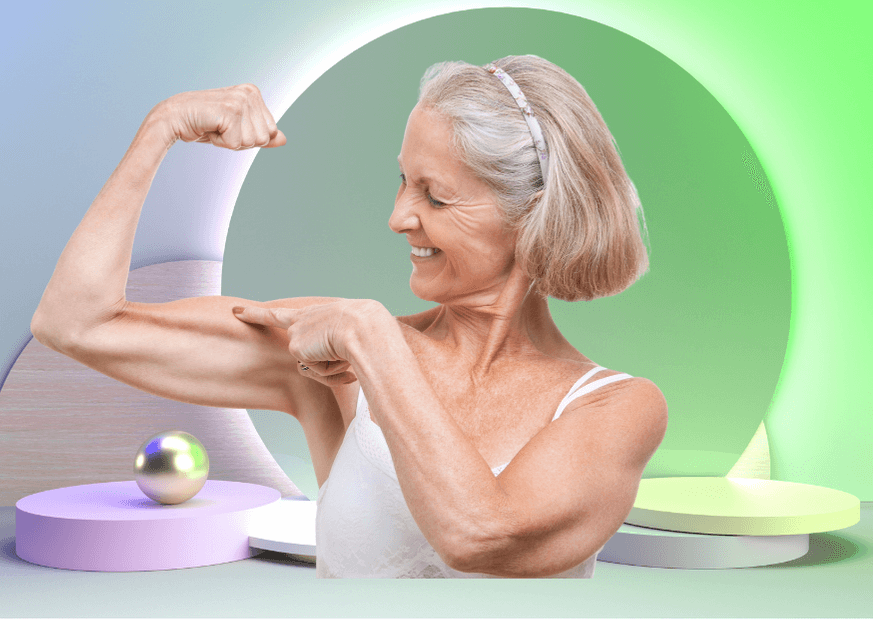Learn how self-confidence can positively impact the lives of mature women in menopause. This article explores practical tips and insights to strengthen self-esteem and navigate midlife changes with determination and self-acceptance. Read on to discover how to build and maintain self-confidence during this unique phase of life.
Self-confidence is an essential ingredient for a fulfilling life. It plays a crucial role in our well-being, our decisions, and how we face the challenges of daily life. Especially for mature women going through menopause, self-confidence can be an invaluable asset.
“A mind that trusts itself is light on its feet.”
Nathaniel Branden
What Is Self-Confidence?
Self-confidence is the belief in your own abilities, competencies, and judgments. When you have confidence in yourself, you are more likely to make informed decisions, stand up for your opinions, and face challenges with courage. Self-confidence means you can deal with what life has in store for you.
However, it’s crucial to understand that self-confidence is not a fixed quality; it’s dynamic and shaped by experiences, contexts, and emotional states.
During menopause, many women experience significant changes in their lives, both physically and emotionally. These changes can shake self-confidence but also offer opportunities to strengthen it. We will delve into this relationship in more detail.
This guide will explore self-confidence, its relationship with self-esteem, and how it can vary throughout life. Additionally, we will provide tips and strategies for cultivating and strengthening self-confidence, even during menopause, a phase filled with changes and challenges.
Self-Confidence and Self-Esteem: A Powerful Partnership
Self-confidence and self-esteem are interconnected but not the same thing. Self-esteem refers to your worth and respect for yourself and how you see yourself. On the other hand, self-confidence is related to your trust in your own abilities and capabilities. In other words, self-esteem is about who you are, while self-confidence is about what you believe you can do.
Having healthy self-esteem is crucial for sustaining self-confidence. During menopause, many women may feel that their self-esteem is at stake due to physical and emotional changes.
However, it’s important to remember that self-esteem is not tied to conventional beauty standards. Valuing and celebrating your uniqueness is essential in maintaining and strengthening self-confidence.
The Ebbing Nature of Self-Confidence
Self-confidence is mutable, meaning it can fluctuate over time. In different phases of life, you may experience peaks of high self-confidence and periods of lower confidence. It’s essential to understand what can influence these fluctuations:
Influence of Past Experiences
Your past experiences significantly influence your self-confidence. Past achievements, compliments, and success boost self-confidence, while failures or criticisms can diminish it.
Current Context
Confidence can vary depending on the context. For instance, you might feel very confident in your profession but need more confidence in your social skills. This variation happens because different areas of your life involve different sets of skills and challenges.
Self-confidence can vary depending on the context. For example, you may feel very confident in your profession but need more confidence in your social skills. This variation occurs because different areas of your life involve different skill sets and challenges.
Emotional State
Your current emotional state can also affect confidence. When you feel happy, rested, and energized, you’re more likely to feel confident. On the other hand, stress, fatigue, and negative emotions can undermine confidence.
Life Cycles
At different life stages, your self-confidence may go through ups and downs. Menopause, for instance, is a transitional phase that can bring unique challenges but also opportunities to bolster self-confidence.
Practice and Development
Self-confidence can be enhanced and developed. Through practice, acquiring new skills, and facing challenges, you can increase your self-confidence over time.
Self-Acceptance and Self-Compassion
Cultivating self-acceptance and self-compassion can help maintain self-confidence during low periods. Treating yourself with kindness and understanding, even when facing difficulties, is essential for regaining confidence.
External Support
Sharing your concerns with friends, family, or a mental health professional can effectively deal with temporary dips in self-confidence.
We mature women experiencing menopause, face changes in our lives that can challenge our self-confidence. Fluctuations in self-confidence are normal, and understanding the factors that influence them allows us to manage them effectively. The next part of this guide will offer practical strategies to strengthen self-confidence, regardless of the challenges menopause may bring.
Cultivating and Strengthening Self-Confidence During Menopause
Menopause is a period of transition and self-discovery, making it a unique opportunity to strengthen self-confidence. Here are some practical strategies for cultivating and maintaining self-confidence during menopause:
Keep Promises
An effective way to build self-confidence is by keeping the promises you make to yourself. Set realistic goals and work towards achieving them. Your self-confidence increases when you realize you can trust yourself to fulfil your goals.
List Your Accomplishment
When self-doubt sets in, make a list of all the things you’ve successfully achieved in your life. This is a tangible reminder of your skills and accomplishments, strengthening self-confidence.
Step Out of Your Comfort Zone
Self-confidence tends to stagnate within the comfort zone. Challenge yourself to try new things and confront your fears. Each time you overcome a challenge, your self-confidence grows.
Cultivate Self-Compassion
Remember to treat yourself with kindness and understanding, especially during periods of low self-confidence. Don’t be too critical of yourself. Self-compassion is a key ingredient in maintaining and regaining self-confidence.
Seek External Support
Talking to friends, family, or a mental health professional can provide the necessary perspective and emotional support during times of low self-confidence. Don’t hesitate to ask for help.
Set Realistic Goals
Establish goals that are achievable and aligned with your values and interests. Progress towards these goals will strengthen your self-confidence.
Practice Self-Care
Take care of your physical and emotional health. Self-care, such as meditation, holistic therapies, or simply relaxing, helps recharge your energies and maintain a healthy emotional state.
During menopause, changes in your body and emotions can shake your self-confidence. However, with practice and self-compassion, you can nurture resilient self-confidence.
Valuing your past achievements and embracing new challenges can bolster your self-confidence, even when you have doubts about the future.
Conclusion
Self-confidence is a skill that can be cultivated and strengthened throughout life. For mature women going through menopause, this journey is an opportunity to embrace the wisdom that experience brings and live it with confidence and authenticity. Remember that self-confidence is mutable, and fluctuations are normal. With the right strategies and support, you can face menopause with self-confidence, determination, and a renewed sense of self-worth.
As we tackle the unique challenges that menopause presents, remember that self-confidence is a skill you can enhance. Every step you take toward better self-understanding and facing your fears is a step toward stronger and more resilient self-confidence. Menopause is not the end but rather a new opportunity to fortify yourself and embrace your true essence.


